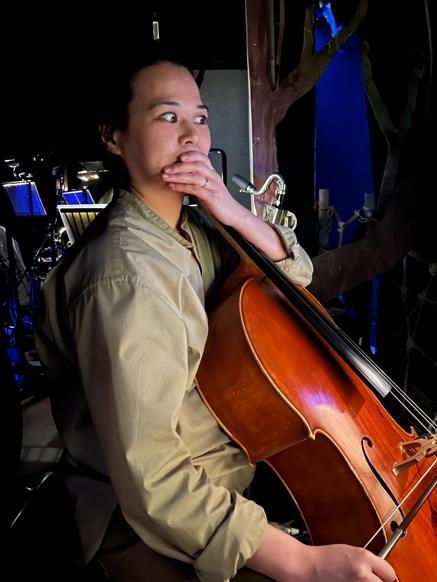The Strad’s online editor and cellist Davina Shum has just completed a three-month run of My Neighbour Totoro at the Barbican Theatre. Here she shares her strategies for how she kept the repeated performances fresh and spontaneous without forsaking her sanity

Discover more Featured Stories like this in The Strad Playing Hub
At first glance, doing a 118-show run of the same production can seem daunting. When you’re playing the same notes in the same show for three months, how do you keep things fresh?
Repetitive actions can seem mind-numbingly boring, however with some simple strategies and techniques, I found some ways to bring intentionality and focus into performances. In doing so, I had the pleasure of being part of a show where I learnt something new every day, whether that was an aspect of my own playing or the wider production.
Remember, each show is different
There is nothing like live performance to bring you into the present moment. Obviously, many elements of a show need to be predictable in the sense that the production goes to plan, but some things, like pacing, tempo and personnel, can change quickly. Keep your eyes open for new things – it’s what makes live performance exciting!
Find ways to improve
In a way, playing the same show night after night is an absolute blessing presented to you because you can actively hone your craft while performing. Rather than go onto auto-pilot, you have the opportunity to think about what you’re doing. In the same way that actors develop into their roles, so too must musicians find ways to evolve their parts.
Pedro de Alcantara recommends taking a passage that isn’t technically difficult, and making small changes in your playing, such as dynamics, bow hold and height of elbows and wrists.
‘Start combining these changes and you’ll quickly see that you have infinite combinations at your disposal,’ he says. ‘You can play the same phrase a hundred times and never play it in exactly the same way twice.’ Perfect for a show that is always evolving.
We’re always being told by our teachers to record ourselves in our practice. I found it so valuable to watch and listen to the archive recording of the show, which illustrated how incredibly DEAD my sound was at moments. I must have slipped into auto-pilot mode! It was all the motivation I needed to start focus on keeping my sound alive with vibrato and attentive listening.
Consider other perspectives
The role of a show musician is just one cog in the huge machine of a theatrical production. One thing I love about working in theatre is that most people are genuinely so happy to be there – it’s an industry borne out of passion. Take the time to discover the other roles – I learnt so much chatting to actors about the challenges of their tracks, such as quick changes, or learning new lines at the last minute, as well as observing the stage managers handle scene changes or watching the follow-spots stick to the actors onstage.
Just as you would delve into a score to learn a piece of repertoire properly, it is so valuable to learn how the different elements come together to create a narrative. It’s this connection with colleagues that make a production a joy to work within – whether it’s a small musical passage you share with one of your bandmates, or catching an actor’s eye while they wait in the wings – these moments remind us that our purpose within a production is united.
Engage with the production and find context
It’s easy as a musician to get caught up in the minute technical details of playing your instrument – indeed, it’s that attention to detail that partly gets us work in the first place. But considering the context and finding out why you’re playing what you’re playing can be super rewarding.
String parts in musical theatre often feature plenty of atmospheric long notes. My Estonian friend calls them kartulid, or ‘potatoes’, based on the shape of seemingly endless semibreves. While it’s easy to slip into a vegetative state while playing these notes, think: what are you contributing here? If the composer/orchestrator didn’t want you to play, they would’ve written you out! Despite what you might think, you are necessary.
I’ve played in some shows where I’ve been onstage and therefore been privy to what’s going on. Other times (and perhaps this is more common) musicians are tucked away in the pit, with only the sound of the actors thumping around onstage and the audience reaction to gauge what’s happening. There are moments of some shows where I had absolutely no idea what was going on. Again, if you can get your hands on an archive recording of the show, you’ll understand so much more of what’s happening, which will help you play your part with the best intentions.
Read: The Anatomy of Deliberate Practice: Violinist Susanna Klein
Read: Scaling the walls: what musicians can learn from bouldering
…but remember to disengage at times
Some shows deal with tough themes. Totoro had some heartbreaking scenes depicting grief and the fear of loss, while another show in which I played ended every night in a gruesome, bloody murder. It can be heavy dealing with this every night – while it’s good to be aware of the issues that these shows bring up, make sure to find a way to disengage and remember that it’s not real!
Listen to your body
Both of my jobs – as online editor for The Strad and as a cellist – are sedentary roles, meaning that I need to ensure I incorporate some motion so that I don’t destroy my spinal and muscular health! I found that building up my repertoire of stretches and exercises helped keep those aches and pains at bay. Listen to what your body needs – for me my favourite exercises as a cellist target lower back strength, shoulder alignment and nerve glides, but everyone is different – find what works for you. Make sure to move – get into the habit of a stretching and warm up routine so that those repetitive actions don’t take a toll on your body.
In addition to muscular and skeletal health, it’s important to make sure your body is getting the right nutrition for you to perform at your best. Opt for food that’s going to make you feel well-fed, but not heavy. Pizza and Coke might be delicious before a show, but with regrettable (gassy) consequences. Apologies to all my past band mates. Enough said.
Caffeine
There are going to be days where you don’t want to do any of the above and survival mode kicks in. For these days, caffeine is your best friend. You’ve done the ground work, so just get through – after all, the show must go on!
Davina’s next challenge is a six-month run of Oklahoma! at the Wyndham’s Theatre from February to September 2023.
Read: That festival feeling: Postcard from the 2022 Carl Nielsen Competition
Read: Opinion: Why we should place less importance on grades
Read: Fake it ’til you make it: The art of orchestral faking
Read more Featured Stories like this in The Strad Playing Hub












































No comments yet